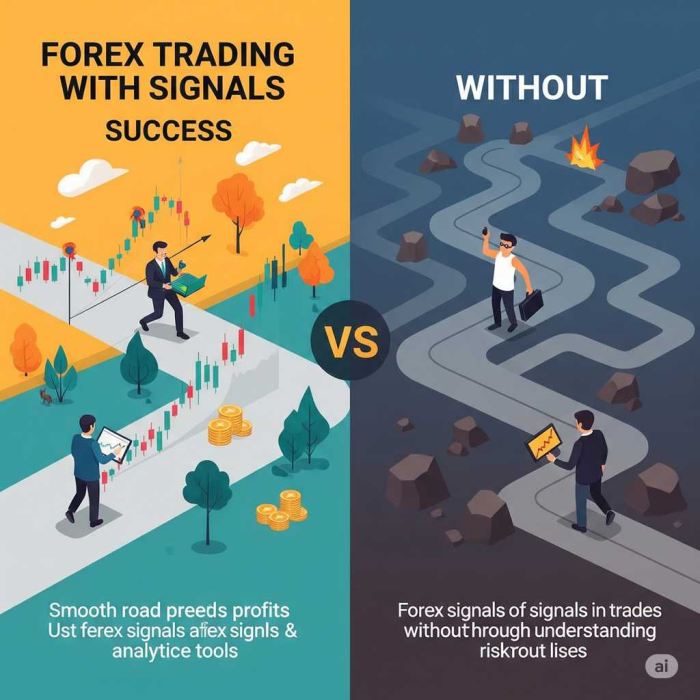Forex Signals | Your Shortcut to Trading Success or a Risky Bet?
The allure of the foreign exchange (forex) market is undeniable: the potential for significant profits, the excitement of global economic shifts, and the flexibility of trading from anywhere. But for many, especially newcomers, the sheer complexity of market analysis can be daunting. Enter forex signals – automated or human-generated trading alerts that promise to simplify the process.
But are they the magic bullet many hope for, or a potential pitfall for the unwary trader? Let's delve into the pros and cons of using forex signals to help you make an informed decision.

What Exactly ARE Forex Signals?
At its core, a forex signal is a suggestion for a trade, typically including the currency pair to trade (e.g., EUR/USD), the entry price, the take-profit level (where you close the trade for profit), and the stop-loss level (where you close the trade to limit losses). These signals can be delivered via email, SMS, Telegram, or dedicated platforms.
The Pros: Why Traders Are Drawn to Forex Signals
1. Ideal for Beginners
Let's face it, diving into forex trading without prior knowledge can feel like navigating a minefield. Signals can provide a much-needed starting point, allowing new traders to execute trades without having to master complex technical and fundamental analysis from day one. It's like having a seasoned guide show you the ropes.
2. Time-Saving Convenience
Life is busy. Not everyone has hours to dedicate to charting, news analysis, and economic calendar monitoring. Forex signals offer a convenient solution, allowing you to participate in the market without the intensive time commitment. This is particularly beneficial for those with full-time jobs or other commitments.
3. Access to Expert Analysis
Many signal providers boast teams of experienced analysts, sophisticated algorithms, or both. By subscribing to their signals, you're essentially leveraging their expertise and research, potentially gaining insights you might not have the capacity or knowledge to uncover yourself.
4. Emotional Detachment
One of the biggest enemies of a trader is emotion – fear of missing out (FOMO), greed, or panic can lead to irrational decisions. When you follow signals, you're essentially adhering to a pre-defined strategy, which can help remove emotional biases from your trading decisions.
5. Learning Opportunities
While signals simplify trading, they don't necessarily stifle learning. By observing the signals, you can start to understand why certain trades are suggested. Over time, you might begin to recognize patterns, indicators, or fundamental drivers that influenced the signal, gradually building your own trading knowledge.
The Cons: The Risks You Need to Consider
1. Dependency and Lack of Learning
The biggest drawback is the potential for over-reliance. If you solely depend on signals, you might never truly learn how to trade independently. This leaves you vulnerable if the signal provider stops operating or their performance declines. You become a follower, not a true trader.
2. Signal Provider Reliability and Scams
The forex signal market is unfortunately rife with scams and unreliable providers. Many promise unrealistic returns, use aggressive marketing tactics, or simply provide poor-quality signals that lead to significant losses. Due diligence is absolutely crucial before committing to any service. Look for transparent track records, realistic claims, and positive, verifiable reviews.
3. Delayed Execution and Slippage
By the time a signal reaches you and you execute the trade, the market price might have moved, resulting in "slippage." This means you might not get the exact entry or exit price recommended, impacting your profitability. In fast-moving markets, this can be a significant issue.
4. Lack of Customization and Risk Management
Most signal services offer a one-size-fits-all approach. This means the risk tolerance embedded in their signals might not align with your personal risk appetite. You might be taking on more risk than you're comfortable with, or missing out on opportunities that fit your profile better. Effective risk management is highly personal and often hard to achieve when simply following external signals.
5. Subscription Costs
Good quality forex signals often come with a recurring subscription fee. While some may see this as a necessary investment, these costs can eat into your profits, especially if your trading capital is small or the signals don't consistently generate sufficient returns.
The Verdict: Are Forex Signals for You?
Forex signals can be a valuable tool, especially for beginners looking to dip their toes into the market or for busy individuals who can't dedicate extensive time to analysis. However, they are not a guaranteed path to riches and come with inherent risks.
Before you jump in, consider these questions:
- What is your trading goal? Are you looking to learn, or simply make quick profits?
- How much risk are you willing to take?
- Have you thoroughly researched the signal provider? Look for transparency, verified results, and realistic expectations.
- Are you prepared to understand the why behind the signals, even if you're not generating them yourself?
Ultimately, while forex signals can offer a convenient shortcut, the most successful traders are those who understand the market, manage their risk effectively, and continuously learn and adapt. Use signals as a stepping stone, not a crutch, and always remember that your financial future is your responsibility. Trade wisely!
Popular Tags